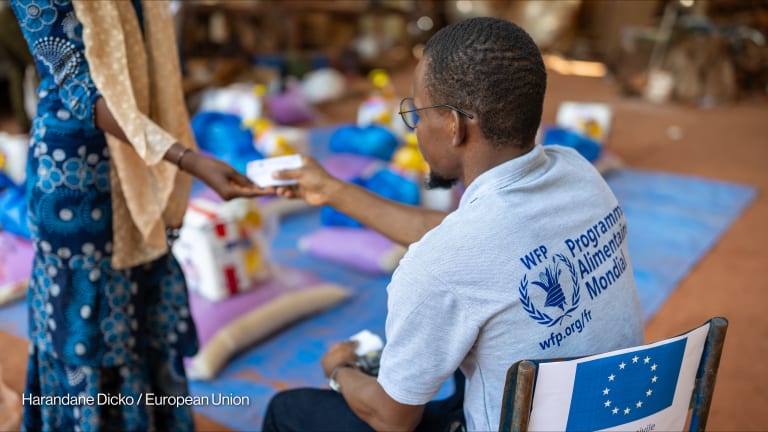
LONDON — The head of the United Kingdom’s Department for International Development has said the plan to spend 30 percent of U.K. aid money through other government departments is “not set in stone,” and hinted she would not be afraid to reclaim DFID’s money if necessary.
Speaking in an evidence session before the International Development Committee on Wednesday, Penny Mordaunt said she was broadly supportive of non-DFID agencies spending official development assistance, but that so far the money has not all been well spent.
“There is merit in other departments spending ODA, but they have to spend it well,” Mordaunt told committee members in the House of Commons. She continued: “We are not in the right place … [We] need to raise quality and raise coherence of what we are doing across government.”
When asked by IDC chair and Labour member of parliament Stephen Twigg whether this could mean some government departments lose their ODA allocations, Mordaunt hinted it was a possibility.
“We are coming towards a new spending review [and] departments will want to demonstrate that they are in shape to spend ODA well if that forms part of their plans,” she said, adding “it’s not set in stone who has got what; in the future it may change.”
She also added, however, that “just hoovering money back into my department is not going to be the absolute best way,” outlining the steps being taken to increase support and oversight of other departments’ aid spending.
The U.K.’s November 2015 Aid Strategy called for 30 percent of ODA to be spent outside DFID by 2020. Last year, 27.5 percent was spent through other departments.
Which non-DFID departments are spending ODA, and how?
The latest official development assistance statistics show that the proportion of United Kingdom aid being spent outside the Department for International Development has risen by 50 percent year-on-year. Devex looks at which other government departments are spending the most ODA, what they use it for, and what concerns it raises.
The policy has proved controversial within the aid sector, however, over concerns about the transparency, accountability, and effectiveness of ODA spent outside DFID, as well as the coordination and coherence of aid spending across government.
A recent review of the cross-government Conflict, Stability and Security Fund, a 1.2 billion British pound ($1.7 billion) fund hosted by the Foreign & Commonwealth Office, of which 41 percent is ODA, did little to allay fears. The review, carried out by the U.K.’s aid watchdog, the Independent Commission for Aid Impact, concluded that the fund’s results management was “below standards expected for aid programs, with basic information on achievements frequently missing or incomplete.”
“My department is where the real expertise in development sits and we need to get out and enable other government departments to also have that expertise.”
— Penny Mordaunt, U.K. secretary of state for international developmentMordaunt alluded to several critical reviews of cross-government funds during the hearing, saying: “I’m not going to say that the cross-government funds or spending going on in other government departments is good. We know from external scrutiny ... that it’s not where it needs to be.”
Among MPs’ complaints was the FCO’s spending of 46.9 million British pounds of ODA in China in 2016 to support diplomatic work, as well as thousands spent on projects to support the Chinese film and television industry.
China is ODA eligible, but Mordaunt suggested that neither DFID nor China consider the country an aid recipient.
While there is a “case for diplomacy” as one of the “best returns on investment,” DFID does not provide aid money to China, she said, but instead seeks to have it as a “key partner” in order to “shape what they do.” Her department has been working with the country to boost its global health and humanitarian work, she added.
“I think you’ll see us and other departments continuing to work with them [China], but it won’t be on an aid basis,” Mordaunt told the committee.
In response to the concerns raised about cross-government spending, she said her team at DFID is working to strengthen oversight and to build capacity within non-DFID departments, stressing that “my department is where the real expertise in development sits and we need to get out and enable other government departments to also have that expertise.”
“What we need to make sure is anyone who spends ODA funds in the future is really equipped to do it well, … that we are very strategic in how we are allocating those budgets, and that across government, we have complete coherence about what it is we are trying to do,” she said.
She mentioned “new structures” had been developed to oversee cross-government funds, including a cross-ministerial oversight group, and said there was a willingness among other departments to cooperate.
“We have real commitment now across government to crack on with this and to make sure people have got what they need to do this really well” — adding, “and they’ll need to.”
Claire Godfrey, head of policy and campaigns at Bond, the U.K.'s network of international development NGOs, welcomed Mordaunt’s comments “confirming that the 30 percent target for ODA spent by other government departments is not set in stone.”
Godfrey was pleased to hear the secretary of state confirm “that ODA will only be spent by those who ensure that the 0.7 percent [aid budget] is not just ‘spent well, but couldn't be better spent,’” she said.
“As more ODA is increasingly spent outside of DFID, a world leader in effectively reducing poverty, we need to ensure the world's poorest people remain at the heart of how ODA is invested,” she added.








